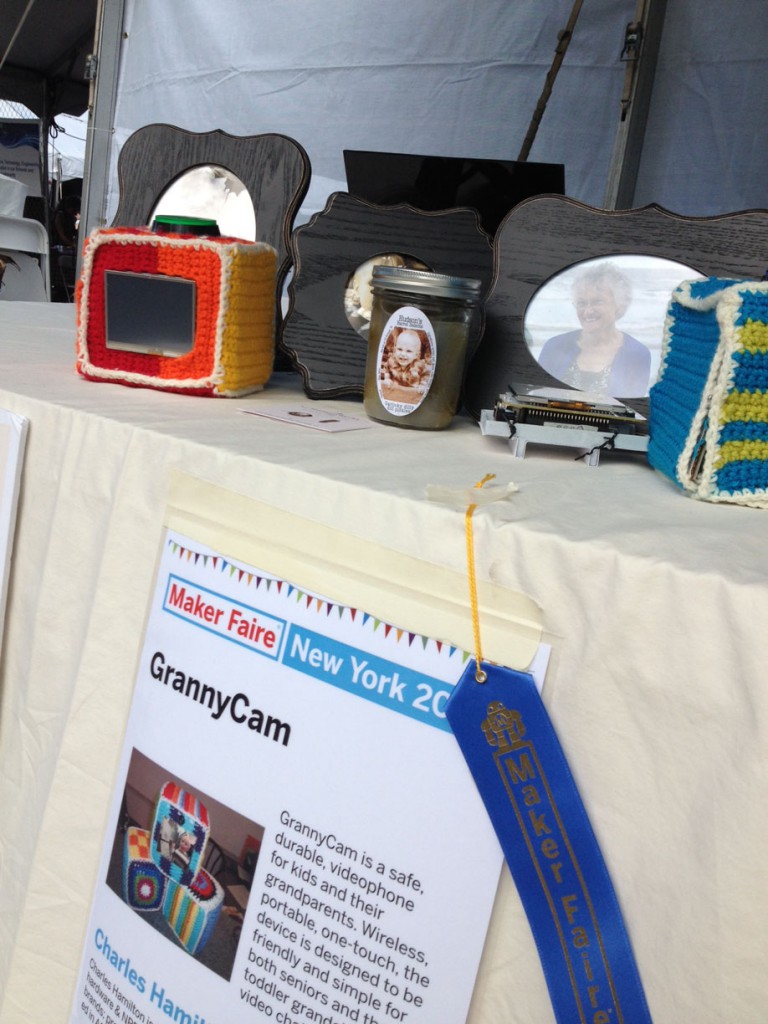By Tara Stratton
The holidays are around the corner, and with them come the fun and
excitement of big family gatherings. However, a lot of families are
spread across the country and not able to get together for the
holidays. Thats why Charles Hamilton developed GrannyCam, a safe,
durable videophone that his kids can use to stay in touch with their
grandparents, not only during the holiday season but throughout the
year. In September, the device received great response and an
Editors Choice Blue Ribbon from Make Magazine at Maker Faire New
York.

GrannyCam is a wireless, portable, one-touch videophone designed to
be extremely simple and friendly to operate so seniors and their
young grandchildren can video chat anytime. The project grew from
observing my mother and two-year-old son, who struggled with the
typical toolssmartphones, computers, tablets available for speaking
to one another. For my mom, now in her 70s, the tools currently
available are an enormous challenge: too feature-laden, too complex.
For my son, the tools are also challenging, but for slightly
different reasons: too easily broken or disconnected, too expensive
to handle unsupervised, too fraught with concerns over privacy, said
Charles. GrannyCam enabled Charless little boy to speak to his
grandma without help so that they can more easily keep in touch.
GrannyCam provides a quick and easy way to share the latest progress
in our sons development and provides an opportunity for increased
socialization and improvements in our toddlers speech.
GrannyCams external design is friendly for both grandmas and
toddlers. The hardware is covered in a soft, crocheted shell. A
physical button includes an oversized arcade-style button for both
initiating and accepting a chat session. The button also flashes to
alert an end user that they have an incoming call.

The current GrannyCam prototype is built around the
Sitara-processor-based BeagleBone Black
open-source computer, which connects to an LCD screen, a webcam and
a sound card. Devices communicate with each other over Wi-Fi
(dongled) via open-source VoIP/SIP software. No cellular connection
is planned as part of the design roadmap. Power supply is currently
AC, though one of Charless next goals is to upgrade to rechargeable
DC. Configuration of the devices is done remotely via command line
or browser.

Charles says he chose the BeagleBone Black to power GrannyCam
because its high performance enables delivery of simultaneous voice
and video for chat sessions, and its truly open source design
provides significant advantages for the long-term design criteria of
the device. After trying out Ångström and Debian distributions,
Charles finally settled on Ubuntu 12.04 as it is the most stable in
handling the video chat client software. Charles said he is
currently also investigating a port of Tizen onto BeagleBone Black
with a port of a SIP client package as well. He is hoping these
options may lead to a better solution with higher data throughput,
viz., smoother video and better audio quality.
Charles was able to rapidly prototype GrannyCam and is now
generating user feedback and gauging interest in the device as a
potential product. His long-term vision for GrannyCam is to create
a product that is scalably manufactured and leverages open-source
hardware and software. The product path includes a design for a
modular platform that can add sensors to make the device a more
integrated part of the home monitoring landscape for seniors.
For more information about GrannyCam, visit
http://hudsonwerks.com/current-projects/grannycam/.
You can also check out Charless blogs on
DIY electronics and hardware products as well as
tech trends in health and wellness.

